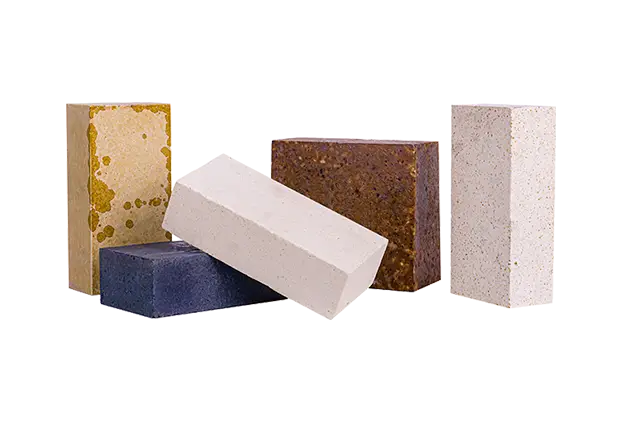
1. Used in incinerators, glass/ceramic furnaces and various furnaces, kilns, etc
2. High thermal stability, allowing reliable operation even in extreme temperatures
3. Top manufacturer, 20 years of experience, quality assurance, competitive price
4. Free samples, please contact us for spec and price
WhatsApp:
+8615038278221Email:
info@rsrefractories.com
Refractory bricks are materials designed to withstand high temperatures, chemical corrosion, and thermal shock. They are widely used in high-temperature industries such as metallurgy, chemical engineering, construction, and ceramics. Made from raw materials like bauxite, silica, and magnesite, refractory bricks offer excellent compressive strength, heat resistance, and thermal stability. They effectively insulate heat, improve energy efficiency, and extend the service life of equipment. Depending on the application, there are various types of refractory bricks, including high alumina, silica, and magnesite bricks, which are essential for furnaces, boilers, and other high-temperature devices.
| Material | Main Composition | Bulk Density g/cm³ | Apparent Porosity % | Normal Service Temp ℃ | Max Service Temp ℃ | Cold Crushing Strength MPa | Typical Applications |
|---|---|---|---|---|---|---|---|
| Fireclay Brick | Al₂O₃ 30–45% | 2.0–2.3 | 20–26 | 1200–1350 | 1400 | ≥30 | Industrial furnace linings |
| High Alumina Brick | Al₂O₃ 48–75% | 2.3–2.6 | 18–24 | 1400–1700 | 1800 | ≥50 | Kilns, reheating furnaces |
| Corundum Brick | Al₂O₃ ≥90–99% | 2.8–3.1 | 15–20 | 1700–1850 | 1900 | ≥70 | High-temperature furnace linings |
| Silica Brick | SiO₂ ≥93% | 2.3–2.4 | 20–24 | 1500–1650 | 1700 | ≥30 | Coke ovens, hot blast stoves |
| Magnesia Brick | MgO ≥85–97% | 2.9–3.1 | 16–22 | 1600–1800 | 2000 | ≥50 | Converters, electric arc furnaces |
| Magnesia Chrome Brick | MgO–Cr₂O₃ | 3.0–3.2 | 15–20 | 1700–1850 | 2000 | ≥60 | Cement rotary kilns |
| Spinel Brick | MgAl₂O₄ | 2.8–3.0 | 16–20 | 1650–1800 | 1900 | ≥60 | Ladles, rotary kilns |
| Carbon Brick | C ≥90% | 1.5–1.7 | ≤10 | >2000* | >3000* | ≥35 | Blast furnaces, vacuum furnaces |
| Zirconia Brick | ZrO₂ ≥94% | 5.6–6.0 | 10–15 | 2500–2700 | 2800 | ≥100 | Glass furnace critical zones |
1. Metallurgical Industry
Used in blast furnaces, steelmaking furnaces, and other high-temperature equipment to withstand molten metals and slag.
2. Cement Production
Applied in rotary kilns, clinker coolers, and other equipment involved in cement manufacturing.
3. Glass Industry
Used in glass melting furnaces and tanks to withstand extreme heat and corrosive environments.
4. Petrochemical Industry
Used in reactors, catalytic crackers, and other high-temperature processes to resist chemical corrosion.
5. Power Generation
Employed in boilers, incinerators, and furnace linings to handle high temperatures and thermal shock.
Comprehensive Refractory Product Range
We manufacture 3 main types of refractory materials — refractory castables, high alumina cement, and refractory bricks — covering 100+ industrial furnace types worldwide.
Certified Quality and International Standards Compliance
All batches undergo strict quality control. Products comply with ISO, ASTM, and GB standards, ensuring reliable performance in high-temperature industrial applications.
Annual Production Capacity of 130,000 Tons
With a large-scale capacity of 130,000 tons per year, we guarantee stable supply and on-time delivery for long-term and large-volume projects.
Exported to 120+ Countries and 1,000+ Projects
Our products have been successfully delivered to over 120 countries, supporting more than 1,000 industrial projects, including cement, steel, incineration, glass, and petrochemical furnaces.
20+ Years of Experience in Refractory Manufacturing
With over 20 years of experience, we understand real furnace conditions and deliver materials proven in long-term industrial operations worldwide.
Professional Technical Support and Free Samples
We provide technical assistance from material selection to installation guidance, with free samples available for testing and supporting 1,000+ projects globally.
Fill out the form to request a free, detailed quote.